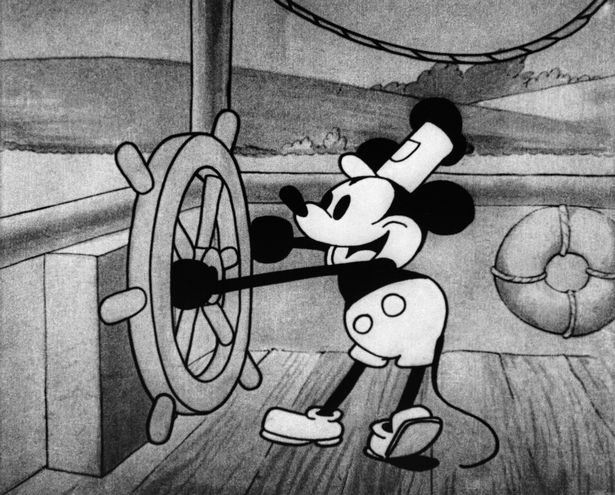
“Miska, Muska, Mickey Copyright!”
Disney Copyright Report
Tucked comfortably in our blanket, watching ‘Mickey Mouse’ to heal our inner child sounds like the perfect plan for a cosy evening. “Muska, Miska, Mickey Mouse!” says our childhood friend, and while we are still contemplating why he said the magical words incorrectly, the clubhouse appears. Much to our horror, it’s menacing with rickety old walls and shattered windows. A blood-stained pink bow and blue cap hang on a broken slide, and the next thing we know, Mickey Mouse is there, but not in the way we know him today. It is the oldest version of him — the Steamboat Willie Mickey — with vampire teeth and blood-red eyes. Sounds impossible because why would Disney ever ruin our childhood innocence? This might become a reality soon because Mickey Mouse will enter the public domain as the copyright for the first animated short film with the mouse, Steamboat Willie, which is set to expire in 2024. But the situation is much more complex than it seems due to the modification of the Disney characters throughout the years and Disney’s registered trademark, Mickey Mouse himself.
The success of the multi-million-dollar company Disney that we see today began with a seven-minute short film Steamboat Willie, the first public appearance of Mickey Mouse and Minnie Mouse. In the film, he discovers his love for music, plays with animals, entertains her, and ends up getting in trouble for his mischief. This 1928 film was the third film featuring Mickey Mouse but the first one distributed and released with synchronised sound, laying down the foundation on which the Walt Disney empire stands today.
The topic of copyright has been heavily debated in U.S. copyright law, thanks to Steamboat Willie. Disney almost lost its copyright for the film in 1983 and 1997, but after a hard fought battle, it successfully influenced the law. It achieved an extension in both instances, giving Disney the copyright for 95 years since its’ release. However, any further extension attempts seem highly unlikely, resulting in Disney losing its’ copyright just for the film in 2024. In other words, if someone wants to adapt the Steamboat Willie character in their works, they will have to strictly stick to the elements in the short film and not the later works. This ensures that the present-day Mickey Mouse — round, lovable with white gloves and big yellow boots — will stay under the protection of Disney’s copyright. It also applies to the films which followed Steamboat Willie in addition to modified versions of Mickey Mouse and other characters until they reach their 95-year mark.
Now, here lies an interesting fact. Disney can hold ownership over Mickey Mouse as long as they want, possibly forever, because it is a registered trademark. Copyright protects a specific creation from plagiarism and is time-limited. In contrast, trademarks don’t expire until and unless the company fails to submit the proper paperwork and are designed to avoid confusion among consumers about a product’s source and quality. This means that as long as Disney can assert that Mickey Mouse is associated with Walt Disney, the character will stay a protected Disney product under the law. Hence, any use of the Steamboat Willie character by creators, even after the film enters the public domain, can probably go under a legal trial for violating the trademark law if Disney successfully establishes the connection between the portrayed version and their trademark.
According to the New York Times, Disney said in a statement, “Ever since Mickey Mouse’s first appearance in the 1928 short film ‘Steamboat Willie,’ people have associated the character with Disney’s stories, experiences and authentic products. That will not change when the copyright in the ‘Steamboat Willie’ film expires.” They added, “We will, of course, continue to protect our rights in the more modern versions of Mickey Mouse and other works that remain subject to copyright, and we will work to safeguard against consumer confusion caused by unauthorised uses of Mickey and our other iconic characters.”
There have been several instances highlighting how Disney is no joke when it comes to Intellectual Property rights, including the time when Disney sued three daycare centres for displaying Minnie Mouse and Mickey Mouse’s life-sized designs. Putting it simply, unless someone comes up with a work like Rhys Waterfield’s live-action horror film ‘Winnie the Pooh: Blood and Honey’ showing a blood-thirsty 1926-version of Pooh with a distorted face and his friend Piglet which no one will mistake for Disney icons, the company cannot take them to court for violation of the law. But this will be quite a challenge because even if they create their own ‘Steamboat Willie Mickey Mouse’ version, the audience will still associate it with Walt Disney because of the strong relationship between the character and the company itself. After all, Mickey Mouse will always remain Disney’s ‘THE’ character because “It all started with a mouse.”
Written by Avishi Khyati for MTTN
Edited by Agnes Uma Chiramal for MTTN
Featured Image by The Mirror
Leave a Reply
You must be logged in to post a comment.